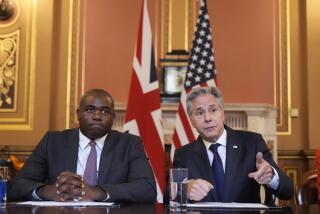Syria Faces Pressure to Halt Alleged Iraqi Oil Flow
- Share via
UNITED NATIONS — The United States and Britain are pressuring Syria to halt what they say are massive illegal imports of Iraqi crude, an oil flow that many believe is Saddam Hussein’s biggest source of undisclosed and uncontrolled hard-currency income.
In a closed-door meeting Monday of the Security Council’s committee on Iraq trade sanctions, Britain called for a formal “clarification” of allegations that Syria is piping in Iraqi crude in defiance of U.N. orders. It was the first time the issue has been officially broached by the committee, which is charged with monitoring enforcement of the sanctions imposed on Iraq after its 1990 invasion of Kuwait.
The committee plans to resume discussion of the alleged oil shipments within the next two weeks, in what Western diplomats described as an effort to force Syrian compliance with the sanctions. Syria did not respond to the allegations Monday. Iraq denies that it clandestinely exports oil to its neighbor.
“Some members believe that smuggling is taking place,” Ole Peter Kolby, the Norwegian ambassador who chairs the committee, acknowledged after Monday’s meeting.
While the term “smuggling” suggests a clandestine contraband operation, Western officials and industry experts say Iraq has been sending Syria 150,000 to 200,000 barrels of oil a day through a large cross-border pipeline since early last year. The Iraqi crude has allowed Syria to double its own oil exports, analysts say, while providing Hussein with half a billion dollars or more outside the U.N.’s control.
After Iraq’s invasion of Kuwait, the Security Council imposed strict controls on Iraqi trade, with payments for approved imports coming from a U.N.-administered account that is supposed to receive all income from Iraqi crude exports.
In November 2000, Syria reopened an old 550-mile pipeline to oil fields in neighboring Iraq for what it said were “testing” purposes. The tests appear to have been successful, industry analysts say.
In January 2001, after reports that oil was flowing through the pipeline, the State Department proposed to Syria that it report any payments for overland oil shipments from Iraq to U.N. sanctions monitors. Officials in Damascus denied that they were buying Iraqi crude--an assertion that industry experts say may have been temporarily true, as the pipeline was apparently shut down last January.
Extrapolating from verified Syrian production and export figures, Iraq has been supplying Syria with about 180,000 barrels of oil a day since last February, calculates John van Schaik of the New York-based Energy Intelligence Group. Although sales arrangements between Iraq and Syria have not been disclosed, “we do know that it is sold at a steep discount,” perhaps as little as half the world market price, Van Schaik said.
Syria produces about 500,000 barrels of oil per day, while its daily domestic consumption has risen to nearly 300,000 barrels, according to U.S. government reports and private industry estimates. Yet Syria is now exporting at least 400,000 barrels per day, industry experts and Security Council officials concur.
Syria could be earning $50 million or more a month from its estimated Iraqi crude imports, with Iraq pocketing a similar amount. Some U.N. analysts believe Hussein’s government is clandestinely exporting an additional 100,000 barrels of oil a day or more by truck to Turkey and Jordan and by ship through the Persian Gulf.
Iraq, meanwhile, in what is regarded by many here as an attempt to deflect growing U.N. pressure to readmit weapons inspectors, has unexpectedly agreed to let a U.N. human rights investigator into the country for the first time in a decade.
Andreas Mavrommatis, the U.N. special rapporteur for human rights issues in Iraq, will travel to Baghdad for “an exploratory mission” next month, the U.N. announced Monday. The last time Baghdad permitted a visit by a representative of the U.N. Commission on Human Rights was in 1992. In April, the Geneva-based commission accused Iraq’s government of subjecting its people to “all-pervasive repression” and “widespread terror.”
A successful crackdown on illegal oil exports could help convince Iraq to open itself up to U.N. weapons inspections, some Western diplomats believe.
Complicating the pipeline dispute is Syria’s entry into the Security Council this year. While Syria could obstruct an inquiry into the pipeline, its desire to wield influence within the council on other issues could make it open to compromise, some diplomats suggest.
John D. Negroponte, the U.S. ambassador to the U.N., raised the pipeline issue with the Syrian government in a visit to Damascus last week, U.S. officials said.
More to Read
Sign up for Essential California
The most important California stories and recommendations in your inbox every morning.
You may occasionally receive promotional content from the Los Angeles Times.













